 W
WJohannes Erwin Eugen Rommel was a German general and military theorist. Popularly known as the Desert Fox, he served as field marshal in the Wehrmacht of Nazi Germany during World War II, as well as serving in the Reichswehr of the Weimar Republic, and the army of Imperial Germany.
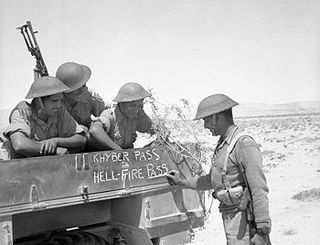 W
WOperation Battleaxe was a British Army offensive during the Second World War to raise the Siege of Tobruk and re-capture eastern Cyrenaica from German and Italian forces. It was the first time during the war that a significant German force fought on the defensive. The British lost over half of their tanks on the first day and only one of three attacks succeeded.
 W
WThe Battle of Bir Hakeim took place at Bir Hakeim, an oasis in the Libyan desert south and west of Tobruk, during the Battle of Gazala. The 1st Free French Brigade under Général de brigade Marie-Pierre Kœnig defended the position from 26 May – 11 June against much larger Axis forces of Panzerarmee Afrika commanded by Generaloberst Erwin Rommel. The Panzerarmee captured Tobruk ten days later.
 W
WOperation Crusader was a military operation of the Western Desert Campaign during World War II by the British Eighth Army against the Axis forces in North Africa commanded by Generalleutnant Erwin Rommel. The operation was intended to bypass Axis defences on the Egyptian–Libyan frontier, to defeat the Axis armoured forces and to relieve the 1941 Siege of Tobruk.
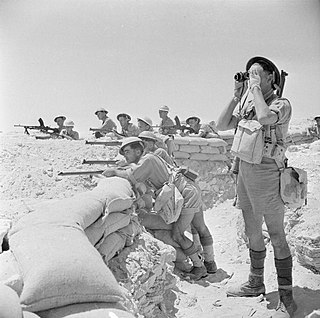 W
WThe First Battle of El Alamein was a battle of the Western Desert Campaign of the Second World War, fought in Egypt between Axis forces of the Panzer Army Africa and Allied forces of the Eighth Army.
 W
WThe Second Battle of El Alamein was a battle of the Second World War that took place near the Egyptian railway halt of El Alamein. The First Battle of El Alamein and the Battle of Alam el Halfa had prevented the Axis from advancing further into Egypt.
 W
WA significant controversy exists over Germany's Bundeswehr's use of Erwin Rommel as its role model. Numerous critics take issue with the Bundeswehr's reverence towards Rommel as its primary role model. While recognizing his great talents as a commander, they point out several problems, including Rommel's involvement with a criminal regime and his political naivete. However, there are also many supporters of the continued commemoration of Rommel by the Bundeswehr, and there remains military buildings and streets named after him and portraits of him displayed.
 W
WThe Field Marshal Rommel Barracks, Augustdorf is a German Army military base located in Augustdorf in the state of North Rhine-Westphalia, Germany, and the largest base of the German Army. The brigade staff and most of the units of the 21st Panzer Brigade are located there. Around 4,300 soldiers serve there.
 W
WOperation Flipper was a British commando raid during the Second World War, mainly by men from No. 11 (Scottish) Commando. The operation included an attack on the headquarters of Erwin Rommel, the commander of Panzergruppe Afrika in North Africa. It was timed for the night of 17/18 November 1941, just before the start of Operation Crusader. The operation failed as Rommel had left the target house weeks earlier and all but two of the commandos who landed were killed or captured. One member of the Special Boat Section team, who had secured the beach for the commando party, also escaped.
 W
WDuring World War II, Operation Gaff was the parachuting of a six-man patrol of Special Air Service commandos into German-occupied France on Tuesday 25 July 1944, with the aim of killing or kidnapping German Field Marshal Erwin Rommel.
 W
WThe Battle of Gazala was fought during the Western Desert Campaign of the Second World War, west of the port of Tobruk in Libya, from 26 May to 21 June 1942. Axis troops of the Panzerarmee Afrika consisting of German and Italian units fought the British Eighth Army composed mainly of British Commonwealth, Indian and Free French troops.
 W
WInfantry Attacks is a classic book on military tactics written by Erwin Rommel about his experiences in World War I. At the time of the book's writing in the mid-1930s, Rommel's rank was lieutenant colonel. Rommel had planned to write a successor called Panzer greift an about tank warfare, and gathered much material during the North Africa Campaign. However, he was forced to commit suicide before completing this work.
 W
WThe First Battle of the Jiu Valley was a military engagement during World War I fought between Romanian forces on one side and Central Powers forces on the other. The German offensive, although initially successful, was checked within days and subsequently repulsed by a Romanian counterattack. This was the most conspicuous Romanian victory during the 1916 campaign, given that it was achieved against forces which were superior in artillery and - initially - in numbers as well.
 W
WThe Second Battle of the Jiu Valley was a military engagement between German and Romanian forces during the Romanian Campaign of World War I. It lasted between 7 and 17 November 1916 and resulted in a German victory.
 W
WThe Battle of Kasserine Pass was a series of battles of the Tunisia Campaign of World War II that took place in February 1943 at Kasserine Pass, a 2-mile-wide (3.2 km) gap in the Grand Dorsal chain of the Atlas Mountains in west central Tunisia.
 W
WThe Battle of Mersa Matruh was fought from 26 to 29 June 1942, following the defeat of the Eighth Army at the Battle of Gazala and was part of the Western Desert Campaign of the Second World War. The combatant on the Axis side was the Panzer Army Afrika (Panzerarmee Afrika, consisting of German and Italian units. The Allied forces of the Eighth Army comprised X Corps and XIII Corps. The battle developed as the Afrika Korps pursued the Eighth Army as it retreated into Egypt. Rommel intended to engage and destroy the Allied infantry formations in detail, before the British had a chance to regroup. The Axis cut off the line of retreat of X Corps and XIII Corps but was too weak to stop the British from breaking out. The fortress port of Mersa Matruh and 6,000 prisoners were captured, along with a great deal of supplies and equipment but the Eighth Army survived.
 W
WOperation Sonnenblume was the name given to the dispatch of German troops to North Africa in February 1941, during the Second World War. The Italian 10th Army had been destroyed by the British, Commonwealth, Empire and Allied Western Desert Force attacks during Operation Compass (9 December 1940 – 9 February 1941). The first units of the new Deutsches Afrikakorps departed Naples for Africa and arrived on 11 February 1941. On 14 February, advanced units of the 5th Light Afrika Division, Aufklärungsbataillon 3 and Panzerjägerabteilung 39 arrived in Tripoli, Libya and were sent immediately to the front line east of Sirte.
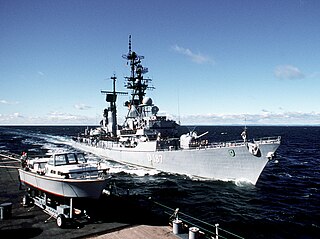 W
WThe German destroyer D187 Rommel was one of three Lütjens-class guided-missile destroyers, a modified version of the American Charles F. Adams class, built for the Bundesmarine during the 1960s.
 W
WThe Rommel Museum was located in Blaustein in the state of Baden-Württemberg in Germany. The museum was dedicated to the memory of Field Marshal Erwin Rommel, popularly known as the "Desert Fox". The museum opened in 1989 and was located in the Villa Lindenhof in the borough of Herrlingen, and closed in May 2019. Among the exhibits were documents, maps and pictures from Rommel's North African Campaign; the museum also exhibited sand collected by German soldiers in North Africa during the campaign. The museum also included the Rommel Archives.
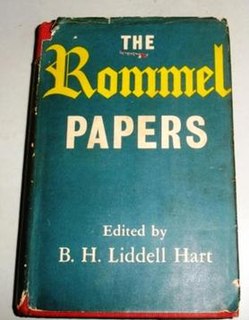 W
WThe Rommel Papers is the collected writings by the German World War II field marshal Erwin Rommel published in 1953.
 W
WManfred Rommel was a German politician belonging to the Christian Democratic Union, who served as Mayor of Stuttgart from 1974 until 1996. Rommel's policies were described as tolerant and liberal, and he was one of the most popular municipal politicians in Germany. He was the recipient of numerous foreign honours. He was the only son of Wehrmacht field marshal Erwin Rommel and his wife Lucia Maria Mollin (1894–1971), and contributed to the establishment of museums in his father's honour. He was also known for his friendship with George Patton IV and David Montgomery, the sons of his father's two principal military adversaries.
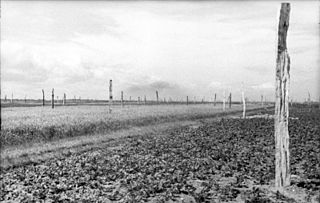 W
WRommel's asparagus were 4-to-5-metre logs which the Axis placed in the fields and meadows of Normandy to cause damage to the expected invasion of Allied military gliders and paratroopers. Also known in German as Holzpfähle, the wooden defenders were placed in early 1944 in coastal areas of France and the Netherlands against airlanding infantry. Rommelspargel took their name from Field Marshal Erwin Rommel, who ordered their design and usage; Rommel himself called the defensive concept Luftlandehindernis.
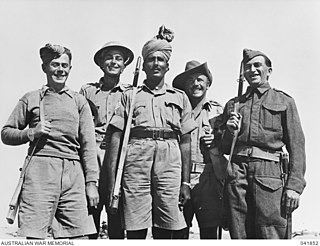 W
WThe siege of Tobruk lasted for 241 days in 1941, after Axis forces advanced through Cyrenaica from El Agheila in Operation Sonnenblume against Allied forces in Libya, during the Western Desert Campaign (1940–1943) of the Second World War. In late 1940, the Allies had defeated the Italian 10th Army during Operation Compass (9 December 1940 – 9 February 1941) and trapped the remnants at Beda Fomm. During early 1941, much of the Western Desert Force (WDF) was sent to the Greek and Syrian campaigns. As German troops and Italian reinforcements reached Libya, only a skeleton Allied force remained, short of equipment and supplies.
 W
WThe Axis capture of Tobruk, also known as the Fall of Tobruk and the Second Battle of Tobruk was part of the Western Desert Campaign in Libya during the Second World War. The battle was fought by Panzerarmee Afrika (Armata Corazzata Africa in Italian German–Italian military force in north Africa, which included the Afrika Korps and the British Eighth Army. The Eighth Army comprised contingents from Britain, India, South Africa and other Allied troops.